Want to know best book for UPSC preparation? Well you have landed on the right article Cracking UPSC is no small feat. It requires the utmost determination and hard work from an individual.
Not only do you have to prepare for two examinations in the form of Prelims and Mains but also an interview which is conducted afterwards.
You need to clear the written examinations to qualify for the interview. So you need to do really well on these examinations. One of the essential items that you will need to fulfil your goal of completing the UPSC exam is the right study material.
The books that you use for your preparation will have a role to play in your result.
Therefore it is necessary to have the best UPSC book list in your hand. So to help you this article has the compiled list of the top 16 books that you would need to score high marks in the UPSC exams also with upsc books for preliminary exam.
List of Best Book For UPSC Preparation (2022)
1. Indian Economy (Economy)
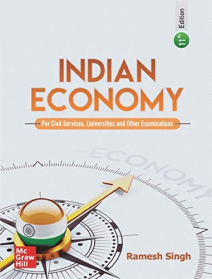
With over twenty years of experience under his belt, Ramesh Singh possesses the expertise to write a book on the economy of India.
He has been publishing this book every year to help UPSC aspirants with their preparations.
Currently, the Indian Economy is on its 14th edition which is relevant for the year 2022-23.
This book has been a popular guide for many students throughout the years. This is because the Indian Economy explains the toughest concepts and ideas in a simple way that makes them easy to understand.
In this book, Ramesh Singh tackles the fundamentals of economics to help the students prepare efficiently for the exam. It is also referred as one of the best ias books.
This edition of the book is up to date with the current policies. It breaks down the Economic Survey 2020-21 and the Union Budget 2022-23. The recent pandemic and its effects on the economy of the country are also discussed.
Features
Video Review
2. Economic Survey (Economy)
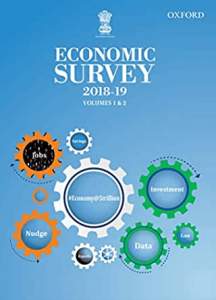
Economic Survey 2021-22 is published by the Publication Division of the Government. It is created every year by the Finance Ministry.
This is an official document that records all the developments that have taken place in the country during the past year.
UPSC aspirants need this book because it covers the major policies and events that are relevant to the examination.
Through this one document, you are informed about the government initiatives that have been implemented along with the possible new initiatives and schemes that can take place in the future.
Several questions from the UPSC Prelims can be seen to be directly taken from the Economic Survey of the respective year. The terminology used here can also be used to boost the quality of your answers.
Features
Video Review
3. Indian Economy For Civil Services (Economy)
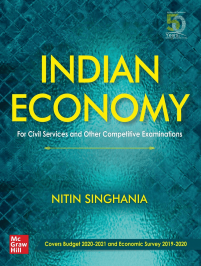
This is the 3rd edition of the Indian Economy by Nitin Singhania published on 1st May 2022.
Similar to the previous, this is also a book on the economy that focuses on the syllabus for the UPSC Preliminary and Mains examination.
It includes questions from the previous years organized by each chapter.
Students will find it easier to comprehend the kind of questions they can get from that particular topic.
Three new chapters have been introduced in this edition on key concepts of economy, food security and management, and health and education.
For better understanding, the book uses multi-coloured charts, flowcharts and graphs to highlight key points.
This book also includes the Union Budget of 2022-23 and the Economic Survey 2020-21.
Overall, this book is ideal for relating static concepts with the dynamic events and policies of the current times.
Indian Economy for Civil Services is a compact solution for students to prepare for their examinations.
Features
Video Review
4. Economic Development & Policy in India (Economy)

Being quite a chunky book, it is able to include a lot of information. Critical issues and ideas are explained in detail with additional graphs and charts.
The information in this book is largely segregated into distinct sections, where each focuses on a particular aspect of the economy of the country.
For example, the first section of the book will introduce the reader to some of the most noteworthy issues that you can see in development with regard to India.
It then moves on to discuss the various sectors of the Indian economy such as agricultural, industrial and public.
Features
5. India Year Book (Current Affairs)
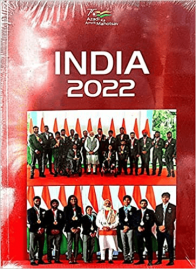
This book is annually published by the Publication Division of the Government of India.
Every year, they compile information from across India in a single book titled ‘India Year Book.’ For this year, the book is called India 2022 Year Book.
It contains information about national news, current affairs, state news as well as the various policies and schemes active in the country.
Different departments are included in this book namely – rural, agriculture, urban, industrial affairs, technology, health, education, economy and art among others.
Since it is published by the Government of India itself, the authenticity of the information within it is guaranteed.
A student can be assured that they are learning the correct information regarding a topic.
Features
Video Review
6. Indian Polity for Civil Services Examinations (Polity)
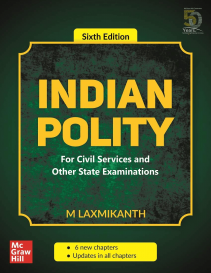
Indian Polity by M. Laxmikanth is another beloved book for UPSC aspirants. It is considered to be one of the most comprehensive books on the subject.
The latest edition to be published by McGraw Hill is the 6th edition of the book.
Apart from the students appearing for competitive examinations, the book can also be useful for people who are interested in the political situation of the country.
It discusses the Fundamentals rights, government bodies, important issues and policies. M. Laxmikanth explains or elucidates the Indian Constitution in detail for the readers.
This chapter and the subject matter in this edition have been prepared according to the latest pattern of the competitive examinations. Recent events such as the developments in the Jammu & Kashmir territory have been included as well.
Features
Video Review
7. Indian Art and Culture (Culture)
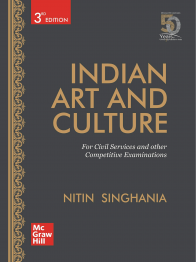
Indian Art and Culture by Nitin Singhania is a complete guide for anyone interested in the cultural history of India.
This makes it an essential book for every UPSC aspirant who wants to score well in the Indian Heritage and Culture section of the General Studies paper.
This book covers all the topics that you would need in the topic of Indian culture – Indian art, music and architecture.
The information is divided into several chapters to make it easier for the students.
Each chapter is also followed by questions that have already appeared in the past examinations.
Indian Art and Culture also provides online material to the students in the form of informative videos and practice tests.
Current affairs regarding Indian Heritage and Culture are also included in the current edition (4th) of the book.
Features
Video Review
8. Oxford School Atlas (Geography)
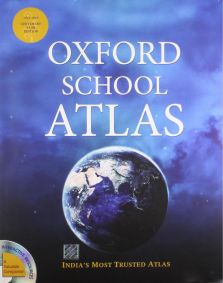
This book hardly needs any introduction. Every school student is required to have it for their geography classes.
Even though UPSC students are no longer in school, this guide is just as useful to them.
The clear and precise maps help students to understand and recreate geographical markers such as mountains and lakes.
This book can be useful to learn or brush up on the knowledge about geography the student already has.
Apart from world maps, it also contains detailed maps of the Indian subcontinent. The latest edition is the 36th one from Oxford Publications.
Features
Video Review
9. Indian Economic Development CBSE Class 12 (Economy)
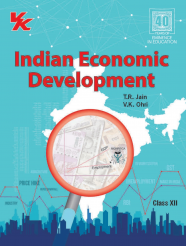
Although this may seem to be irrelevant since it is for CBSE Class 12 Economics, this book will prove to be highly useful.
The publisher releases a revised edition every year so that you can be assured that you are reading the current and updated information.
Since this book is for school students under CBSE, it strictly follows the CBSE pattern for projects.
Indian Economic Development also has a large question bank for students.
Objective type questions such as multiple-choice questions, true or false, fill in the blanks and match the following is present among them.
If the student finds that these questions are still not sufficient and they need a little more practice to be confident in the topic. There is a QR code in the book which will give you access to online additional questions that you can solve.
Features
Video Review
10. A Brief History of Modern India (History)
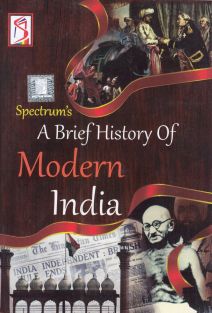
Rajiv Ahir has managed to summarize modern India in just a few hundred pages. It is a massive feat in itself but it has also made it more convenient for students.
Instead of going through bulky books during this period, this one book is enough to give them all the information they need.
A Brief History of India begins with the entry of Europeans on Indian soil.
From the Portuguese to the British, the history of India has been turbulent with many power struggles between the different powers.
It led up to British rule in India and finally freedom from oppression.
The book also briefly touches upon the events following the Independence when the nation was struggling to adjust to its newfound freedom.
UPSC aspirants need this book because it will help them remember the events and information about the modern history of India. This data is structured in a way that is easy for the student to understand and remember for a long time.
Features
Video Review
11. A History of Medieval India (History)
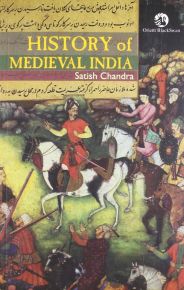
A book about the modern history of India has already been recommended but UPSC aspirants need to study history beyond that.
Students need to be aware of and study the medieval history of India as well. It is just as important as modern events.
In this comparatively short book, Satish Chandra has managed to squeeze in the Indian history of centuries.
The history of the Indian subcontinent from the 8th century to the 18th century has been thoroughly discussed in this book.
The book begins with the Chola Dynasty, followed by the Sur’s and Lodi’s. It eventually concludes with the Mughal rule and the vast empire under it.
There are several different editions of this book. Since medieval Indian history is not something that is changing or will change, you are not required to buy the latest edition. But the current latest edition was published in 2020.
Features
Video Review
12. India’s Ancient Past (History)
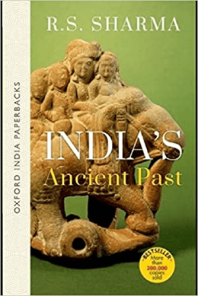
After the medieval history, you will need to get your hands on ancient Indian history books.
For this, no book is better or more equipped than R. S. Sharma’s India’s Ancient Past.
Since it was first published in 2005, it has been a favourite among students because of how engaging it is.
History is often considered to be an uninteresting subject. But, this book makes it interesting for the readers.
UPSC examinations have quite several questions about Indian history, therefore you need to be well prepared in this subject.
R. S. Sharma’s India’s Ancient Past is not only an easy read but also gives you all the necessary information.
It has different sections on the Harappan civilization, Vedic civilization, Maurya dynasty, Gupta dynasty and so on. The book will also provide you with information on the rise of religions like Buddhism and Jainism.
Finally, it will guide you from Ancient India to medieval India through the ending note by the author. Again, it is not necessary to buy the latest edition that was published in 2021.
Features
Video Review
13. Facets of Indian Culture (Culture)
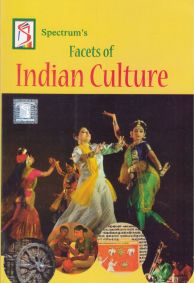
It is undeniable that India is rich in culture and heritage. This makes it all the harder to read and study about them without leaving anything out.
Facets of Indian Culture, published by Spectrum Books makes this task a little bit easier.
UPSC students can now aim to build up their knowledge of Indian culture through this one book.
This is not the only book that you should be reading on culture but it is important because it provides a base for that subject.
Through this book, you are taught about religion, philosophy, music, dance, theatre, cinema, art, architecture along with language and literature.
Each topic is organized in a separate chapter to provide clarity. This book also highlights the changes that Indian culture has experienced in modern times with all the developments in society.
The latest edition of this book from the publishers is from 2021.
Features
Video Review
14. Challenges to Internal Security of India (General Studies)
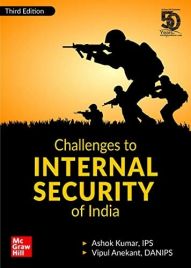
Individual subjects are important for the UPSC examination but so are General Studies.
Procrastinating studying this subject will only make it more difficult for you later on.
This is a large and varied topic that you need to get good and reliable books for.
Challenges to Internal Security of India by Ashok Kumar and Vipul Anekant is just one of those books.
The internal affairs of any country are a dynamic business and India is no different.
So, you should try to purchase the latest edition which is the 4th edition in this case to be up to date with the current happenings in the country.
This edition of the book has been created keeping the current scenario of India in mind. The important issues of today like the pandemic, Jammu & Kashmir Status and the standoff with China are all discussed in this book.
Having this book and reading it will give you a new or improved perspective on these issues.
Features
Video Review
15. India after Independence (History)
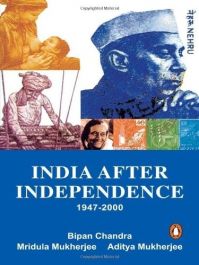
Another history book to brush up on your knowledge of Indian history.
India after Independence is the sequel to the author’s previous best-seller India’s struggle for Independence.
This book follows right after the events of the previous book.
Although India is now free from British rule, it still has a long way to go before it can function effectively on its own.
The challenges that India faced during this time after the Independence were numerous but so were the successes that were gained.
Through this book, the student will be able to understand the effort and hard work that went into building a nation that had been previously ravaged by a foreign power.
The creation of the Constitution and the politics during this time of uncertainty is elaborated on within this book.
Although this edition is pretty old and was published in 2000, it is still relevant and interesting for people looking to learn more about the period 19-47-2000.
The paperback for this book is quite expensive and not always available, so a kindle option has been provided as well.
Features
Video Review
16. Important Judgements that Transformed India (Polity)
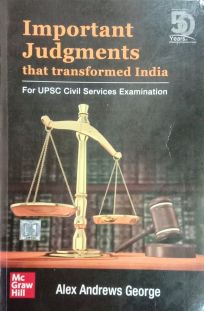
Just like the name suggests, this book is entirely about the judgements that have been passed by the Supreme Court.
The judicial sector of the country has come a long way to uphold Indian laws and protect the citizens of the country.
This book has been specially edited to keep the interests of the students appearing for the UPSC examination.
It is relevant to all three aspects of the examination – Prelims, Mains and the final interview.
The simple language and breakdown of the technical terms make it easy for the student who does not have any previous knowledge or background in law.
Important Judgements that Transformed India has important Supreme Court judgments analysed in separate chapters.
Even if the particular case is complex, this book provides you with a legal context and clear background for you to understand it better.
This book is not limited to those preparing for UPSC, other interested individuals can also read this book and gain an insight into the judicial system of the country.
Features
Video Review
Conclusion
The syllabus for these examinations is vast and seems never-ending. But it can also be conquered with the right mindset. Firstly, you need to make sure that you are giving yourself enough time to prepare sufficiently.
Two or three months are not enough to secure you a good rank. Ten to eleven months before the exam is the ideal time to start preparing and making best UPSC book list should be your first task.
Apart from these guidebooks and NCERT, you need to keep updated with current affairs. Regularly reading the newspaper will help you do that.
I hope you liked our article on best book for upsc preparation, if you have any comments or suggestions do share them in the comments below.
Frequently asked questions (FAQs)
Q1. Which book is best for cracking UPSC?
UPSC syllabus is too vast a syllabus for a person to crack with only one book. The range of information that you need to possess to pass and do well in the examination is large.
There are different subjects that you need to master to prepare yourself for the examination. There are separate books for each subject for a more intensive study. You need to refer to those books to be able to crack UPSC.
Q2. Which book should I read first for UPSC?
Since the portion that you have to study for UPSC is so immense, there is no singular book or subject that you should start your preparation with. Instead, you should begin by brushing up on your basic knowledge. T
his means that you have to go through your school books again. This applies to all the subjects – Polity, Economics, History, Geography, and Science and so on. You need to focus on the NCERT published books.
Q3 How many books are required for UPSC preparation?
With no specific limit on the syllabus, the books that you can read to prepare yourself are numerous. But, keeping the limited time in mind, you need to narrow your study materials to a select few good quality textbooks.
This number can range from 5 to 10 apart from your essential NCERT books. This number can go even higher but it is best to direct your efforts on limited materials at first.
Q4 Which NCERT books are best for UPSC?
For the UPSC examination, all the books published by NCERT are important. This includes all the books from class 6 to class 12 in the relevant subjects.
You cannot prioritize one subject or one class material over the other. You need to study the books from classes 11-12 as well as from the lower class like 6-7. To crack UPSC, you cannot skip over one subject as well. Geography is just as important as History.
Q5 How can I start my IAS at home?
Although it can be daunting to start preparing for the UPSC examination without any formal guidance, it is not impossible. The first thing you need to do is be aware of the syllabus.
You need to know what you are supposed to know for the examination. After that, you can start reading books on those subjects. NCERT is of immense importance.
Other than that, you need to go through the newspaper daily to keep up with the current affairs. The aspirant also needs to choose the Optional subject for his or her paper.
Q6. Is NCERT enough for IAS prelims?
NCERT books are crucial for any IAS prelims aspirant. It provides the basic and general knowledge that the student is expected to have. Every student is required to prepare from them but it is not enough to ensure your success.
Apart from newspapers, you also need to take help from other upsc preparation books to supplement your knowledge from NCERT books. If you thoroughly prepare from all these sources, you are sure to successfully pass IAS prelims.
Q7. How should I start my IAS for beginners?
Even if you are a beginner, you need to take the preparation seriously. Many tend to take it lightly because they have more time or chances to appear for the examination.
As a beginner, you should be brushing up on your fundamental knowledge. Instead of trying to cram all the information 2-3 months before the Prelims, start at least 11-12 months before.
This way, you will have enough time to prepare the Prelims as well as the Mains. During this year or so, you will need to go through NCERT books for classes 6-12, newspapers and reference books on the different topics.
Q8. Which yearbook is best for UPSC?
The India yearbook is published every year by the Publication Department of the Government of India. So, every year, a new revised edition of the yearbook is available for the students.
Therefore, the best yearbook for UPSC is the most recent edition or the one published in the current year.
Here are the Best Books For UPSC Preparation:


